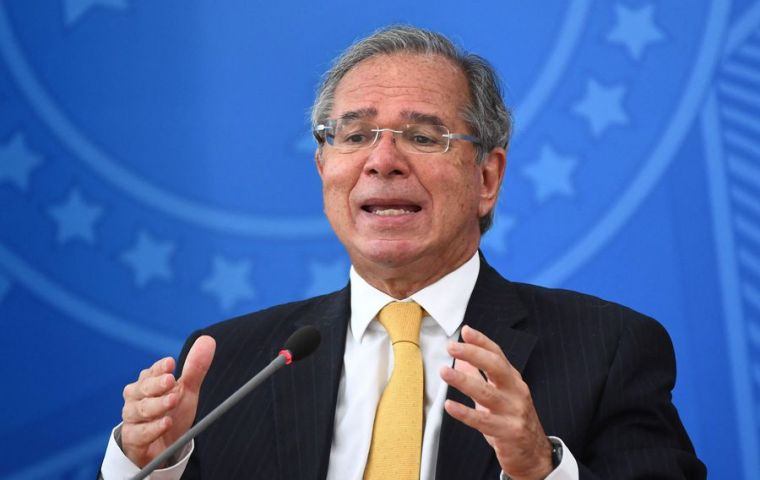 Guedes' figure has lost its aura after being mentioned in the Pandora Papers
Guedes' figure has lost its aura after being mentioned in the Pandora PapersEconomy Minister Paulo Guedes' announcements Thursday shook Brazilian markets after the official admitted he might not meet the public spending ceiling.
In that scenario, the Brazilian real fell 1.7% against the US dollar, closing at 1 US $ = 5.65 R $, the highest rate in 2021, while Sao Paulo's stock exchange Bovespa index recorded a 2.3% contraction.
The ultra-liberal Guedes, who once worked for Chile's military regime of General Augusto Pinochet, acquiesced to the release of some R $ 30 billion (US $ 5.31 billion), to fund President Jair Bolsonaro's new social plan, called Auxilio Brasil, which many analysts regard as a tool towards garnering votes for next year's elections.
The public spending ceiling was added to the Constitution in 2016 under former President Michel Temer. It is designed to prevent any administration from spending beyond inflation. But this time around Guedes said he needed to take a small “license” to attend to “popular though not populist” demands.
Thus, the Government announced it intended to increase the Auxilio Brasil plan by 20%, which in November will replace Bolsa Familia, the successful aid program set in place by the opposition Workers' Party (PT) in 2003 and which has reportedly rescued 54 million people from poverty.
Social plans had never been updated since 2016, after the fall of Dilma Rousseff and now Bolsonaro intends to increase handouts by R $ 100 for the next 12 months as extra help due to the coronavirus pandemic.
The decision means each family will receive R $ 400 (US $ 71) from Bolsonaro's Auxilio Brasil plan, with which the incumbent head of state aims at defeating former President and opposition leader Luiz Inácio Lula da Silva next year.
After the announcement, Lula argued that the PT defended raising the Bolsa Familia to R $ 600 (US $ 110). “Bolsonaro has to face the hunger and misery of the people and give them much more because it is not his money, it is the money of the people which is returning to the people.”
Bolsonaro “can give them money but we are going to win the elections,” said Lula, who is likely to win the October 2022 elections, according to most pollsters.
Guedes' decision also drew harsh criticism from most of Brazil's political columnists who had endorsed the minister despite their open objection to the figure of Bolsonaro.
The minister spoke of a “waiver” (license) to be able to anticipate the revision of the spending ceiling hours after Bolsonaro said in a public ceremony that the constitutional norm that pigeonholes public accounts to control the deficit was going to be respected.
Guedes seems to have lost the internal pulse of the Government with social aid after his figure was weakened by the Pandora Papers scandal when it was discovered that he has an offshore company in the tax haven of the British Virgin Islands worth 9.5 million euros. The company, claims Guedes, has been declared before the Brazilian Treasury and has not had any movements since he took office in 2019 alongside Bolsonaro.
At least 110 million people, almost 50% of the population, have experienced food insecurity in Brazil in the past 12 months, while 19 million are facing famine, according to official data from the Brazilian Research Network on Food Sovereignty (Pessan).
“The fact that exponents of the opposition to the federal government defend higher values of the income support program, such as the one suggested by Lula, of 600 reais per month, should be considered as an additional risk factor for the market because it can further promote pressure from government politicians to higher values of Auxilio Brasil,” the investment bank Renascença Dtvm warned in its daily report.
Brazil's Economy Minister shakes markets with unexpected announcement - MercoPress
Read More
No comments:
Post a Comment